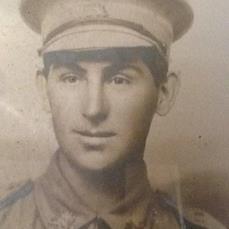Walter Joseph Stokes was born in Orange in 1892 to Walter Jones Stokes and Alice Stokes (nee Whiley). Joseph grew up in Moulder Street and attended Orange Public School. ‘Watty’, as he was known, worked for Dalton Brothers prior to opening Stokes Brothers provision dealers in Summer Street in conjunction with his older brother, George.
Walter joined the rush of young men to be part of the great adventure and enlisted in the 19th Battalion (Infantry) and was allocated to D Company on the 2nd March 1915. He made his way from Orange to Liverpool to undertake his medical. At this time he was unmarried, 22 years and 4 month old. He listed his next of kin as his mother, Mrs Alice Stokes, of 95 Moulder Street, Orange. Although the Army selection minimum height was 5’6″ Walter was accepted at 5’5½” tall. He weighed 129lb with a chest expansion from 31″ to 34½”. His complexion was described as dark, with brown eyes and dark hair. He also declared his religion as Wesleyan.
Sapper Stokes 1313 embarked from Sydney on HMAT Ceramic on 25 June 1915, arriving at Alexandria on 23 July. On 12 August he was transferred to the recently-formed 4th Field Company Engineers in Heliopolis. At this time Walter was allocated a new regimental number of 4141.
Walter served briefly in Gallipoli prior to being hospitalised in Malta, suffering from appendicitis. The Leader reported that he was offered leave to return to Australia, but he refused, electing to return and serve alongside his comrades.
In June 1916 Walter joined the British Expeditionary Force and proceeded to France. In early August the 4th Division advanced to the front line at Pozieres, relieving the 1st and 2nd Divisions that had secured the town just two weeks earlier.
The 4th Division endured a massive artillery bombardment, and defeated a German counter-attack on 7 August; the last attempt by the Germans to retake Pozieres. Walter’s unit was engaged in repairing and widening trenches that had been damaged in the German counter attack, as well as on building placements for the Heavy Trench Mortar Battery.
Sapper Walter Joseph Stokes was listed as being killed in action on 13 August 1916; his body was never recovered. His personal effects were returned to his mother, Alice, in Australia on the ship Beltana. They included two identification discs, two coins, two note books, and a letter.
Walter was awarded the British War Medal No 25711, the 1914/15 Star No 17703 and the Victory Medal No 25533. These were sent to his father, Walter, who also received a Memorial Plaque, also known as a “Death Penny”, and a Memorial Scroll.
The Rev CP Walkden Brown held a memorial service in Walter’s honour at the Methodist Church Orange on 8 October 1916.
On 25 April 1917 the second ever Anzac Day service in Orange was held at the Orange Public School. Mayoress McNeilly placed a laurel wreath on the Union Jack for each fallen soldier who had attended the school, including Walter Stokes.
In July 1917 a tree was planted at Orange Public School in Walter’s memory. It was one of 26 trees planted in honour of fallen soldiers who had attended the school.
Walter Joseph Stokes is commemorated on the World War I Roll of Honour on the southern face of the Orange Cenotaph.
In 1923 the Anzac Memorial Avenue of trees was planted along Bathurst Road to commemorate fallen WWI soldiers. A tree was planted in honour of “Sapper WJ Stokes”; it was donated by VE Fletcher. Very few of the trees are still standing today.
* Andrew Fletcher, 2014

